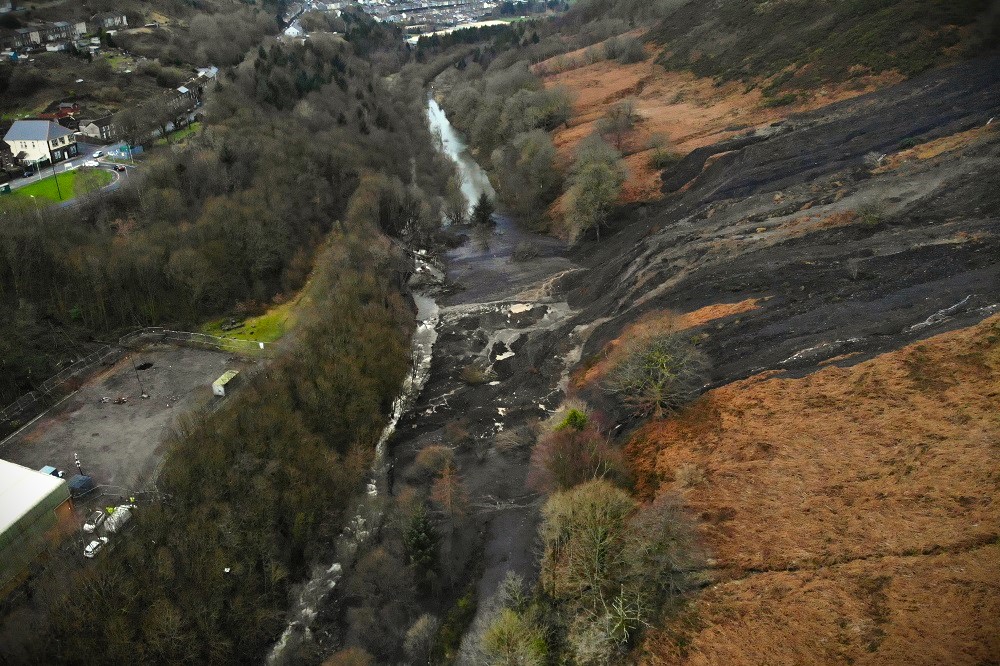Long-overdue’ disused tips bill ‘falls short’

Chris Haines – ICNN Senedd reporter
Proposed legislation aimed at making disused tips safe falls short of the urgent action needed after a landslide saw people evacuated from their homes, the Senedd heard.
Delyth Jewell said the disused mine and quarry tips bill, introduced in the Senedd this week, represents an important step forward but she warned of serious shortcomings.
Plaid Cymru’s shadow climate secretary called for immediate action following a landslip in Cwmtillery during storm Bert in late November and a similar landslide in Tylorstown in 2020.
Ms Jewell told the Senedd the Aberfan disaster should stand as a permanent reminder of the devastating cost that can come from neglect and inaction over many decades.
She questioned why the disused tips authority for Wales that would be established by the “long-overdue” bill will not become operational until 2027.
‘Heightened risks’
She said: “The delay, particularly given the heightened risks posed by the extreme weather that we are seeing increasingly, is concerning…. The absence of any immediate actions could risk undermining public confidence.”
The deputy leader of Plaid Cymru’s group warned environmental protections have been left out of the legislation despite many tips being in ecologically sensitive areas.
She said: “Biodiversity loss is not a small concern, it’s of fundamental consequence to the health of our natural environment and our future resilience.”
Ms Jewell, who represents South Wales East, added: “Another critical gap is the lack of provision for managing clusters of tips, which can mean that there is an increased risk.”
Calling for Westminster to cover the estimated £600m cost in full, she said: “Legislation alone won’t make our communities safer, of course; adequate funding is essential.”
‘Beast of Beddau’
Joel James welcomed the “much-needed” legislation but similarly questioned if sufficient resources are in place to manage more than 2,500 coal tips and 20,000 non-coal tips.
The Conservative raised concerns surrounding the proposed disused tips authority’s powers to fine landowners up to £1,000 for obstructing entry after giving at least 48 hours’ notice.
Mr James also questioned environmental protections, warning new millipede species such as the “beast of Beddau” and “Maerdy monster” could be impacted by remediation.
Alun Davies focused on the recent coal-tip landslide that forced people to flee their homes in Cwmtillery amid torrential rain.
The former minister, who represents Blaenau Gwent, questioned how the bill will help his constituents sleep at night, feeling safe and secure in their own homes.
‘Frightening’
Huw Irranca-Davies, Wales’ climate change secretary who visited Cwmtillery with his Labour colleague to see the “frightening” impact himself, described the bill as a step change.
The deputy first minister told the Senedd: “What we saw there was the very physical manifestation of the fear that people feel when things go wrong….
“We saw the slurry and the slip from the spoil … lapping at the doors of homes, that really does bring it back large to what this is all about – it’s making those people feel safe.”
Mr Irranca-Davies explained a significant amount of work will be required to get the disused tips authority up and running in 2027 but wider work will continue in the interim.
He stated civil sanctions, such as fixed penalties, compliance and stop notices, were left out of the bill because inclusion would make the system overly bureaucratic and unwieldy.
‘Stark warning’
In a statement on December 10, Mr Irranca-Davies said the Welsh Government will have invested £102m in coal-tip safety by the end of the Senedd term in 2026.
He said: “We are keenly conscious of the worry and the anxiety that so many families living near disused tips feel right across Wales. And as we know, the risks are growing as we feel the impacts of the climate emergency.
“The recent storm Bert is yet another stark warning of the damage rainfall can cause and how vulnerable disused tips can be to extreme weather conditions.”
Mr Irranca-Davies said the bill will be the first of its kind in the UK and world leading, helping to ensure tragic mistakes of the past are not repeated.
He told the Senedd the bill does not extend to the restoration of opencast mines, warning doing so could make an already complex bill underdeliverable.
Support our Nation today
For the price of a cup of coffee a month you can help us create an independent, not-for-profit, national news service for the people of Wales, by the people of Wales.






The UK took our coal. They never paid Cymru for the coal resource they have taken out of Cymru. nor full remuneration to our miners.
The UK should pay for the full removal of these disused tips and to use some of the spoils to fill those potholes caused by collapsing disused underground mining that threaten the stability of our towns and villages.
These are threatening people’s homes.
Very true. Westminster always on the take from Wales but rarely the reverse.
The idea that Wales still suffers the ill effects from an industry long gone is a national outrage seeing Westminster responsible for our resource rape with the state run British Coal Board that l made billions are now witness to thousands of dangerous coal slurry sites teetering our valleys that could swallow another community like Aberfan in 1966. The £25 million provided by the UK Government to make safe those areas exploited at risk is simply not enough. It’s an insult seeing the damage done not only to the environment but the heath & wellbeing of those communities affected. And… Read more »